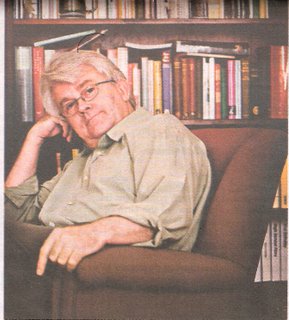 Is Australian literature on the nose? Is it the cultural cringe again? Is the lack of tertiary courses in Australian literature a sign of universities' pandering to the corrupt sensibilities of undergrads?
Is Australian literature on the nose? Is it the cultural cringe again? Is the lack of tertiary courses in Australian literature a sign of universities' pandering to the corrupt sensibilities of undergrads?Two pieces in The Weekend Australian address these questions, and others. On page 10 of the main news section is a story by Rosemary Neill, 'Australia neglecting its own writers', with a flag at the bottom to her other story, 'Lost for Words', which is located in the Review section of the paper.
[Peter] Kirkpatrick [president of the Association for the Study of Australian Literature] believes that today the notion that universities should encourage the development of a national canon is "certainly dead". "Canons aren't really very fashionable at the moment," he says. And [Patrick] White? "He's certainly unfashionable."
And John Frow, head of the English department at Melbourne University (soon to be renamed the culture and communications department) says that the rise of academics wedded to theories of postmodernism is not to blame for this dearth of interest.
The problem may lie elsewhere: lack of interest among students, and the problem of funding, in an age when the federal government is steadily reducing the amount of money that it provides to universities. Peter Pierce, the inaugural professor of Australian literature at James Cook University (in far-north Queensland), "is withering about the idea that cash-strapped universities should offer students only the courses they want":
"This assumes that universities are not there to educate but simply to gratify the necessarily limited background interests of its students, no matter how bright those students are. It's like saying, they won't be interested in higher maths, so we won't teach it."
But while Aus lit courses languish, creative writing is now taught at all 37 of Australia's public universities. The professor of Australian literature at the University of Sydney (and occupant of the only such chair still in existence, apart from Pierce, who is soon to vacate his; there will be no replacement when he does), Elizabeth Webby, suspects that students who take creative writing "see it as an easy option".
Early next year there will be a report into the problem of "how Australian literature is being taught in schools and universities", that is currently being drafted by Austlit. Manager Kerry Kilner says:
"certainly, from my own experience and from discussions with colleagues, there is a definite sense that not enough Australian literature is being taught (at tertiary level)"
Others interviewed for this story include writers Gerald Murnane and David Malouf and literary critic Peter Craven. All paint a bleak picture. But if universities are unable to fund courses that are unpopular, how can they justify them in an age when managerialism and economic rationalism have the upper hand at universities? It's certain that blogs such as Matilda enjoy strong hit-rates, but if tertiary study is absent, maybe the fact that so many people are studying creative writing is part of the cure, rather than the problem. More writers — most of them Australian — will eventually lead to more study. It's a classic case of bootstrapping, it seems to me.
Kirkpatrick may be despondent, Webby dismissive, and Craven outraged, but the large volume of good books being produced nowadays — despite what the pundits tell us — means we'll never run out of things to read. And as a new band of writers emerges from creative writing courses, there'll be plenty to read in the future.
5 comments:
Writing courses make a similar product to that which comes from sausage machines.
With all the university courses in creative writing throughout the world are we seeing the vast improvement in literature that should be part of the equation? Or are we seeing writing that is more formulaic?
Writers learnt to write by writing.
I think that the focus on creative writing is a good thing. It manifests a need for creative activities in society at large. It is a practical pursuit, rather than a critical one. I think the general level of creative writing will improve as a result.
I came across the following quite a few years ago, more than I care remember, and I still think it gets to the essence of writing:
" Sinclair Lewis was invited to talk to some students about the writer’s craft. He stood at the head of the class and asked, “How many of you here are really serious about being writers?” A sea of hands shot up. Lewis then asked, “Well, why aren't you all home writing?” And with that he walked out of the room."
People who 'learn to write' at university, or other places that promise creative success, are writing wannabes and will never be more than critics on the outside looking in.
I have been a member of too many writing groups and writing centres where people published good technical first novels but very few, almost none of them, ever went on to produce the second novel because they were not writers.
You may be right, Ron. I'm biased. One of my oldest friends teaches creative writing. I also respect anyone wanting to improve themselves. It may not be necessary for cretive writing courses to be housed at universities, but in the absence of any alternative arrangements, I think it's better to have more people studying writing, than the opposite.
It begs the question: is writing getting, in general, better as time goes on?
It's no good having good writers unless you have good readers. In fact, writers won't be good unless they'e good readers. If creative writing courses are teaching people to read, well and good, but if not, well, it's a problem.
Post a Comment